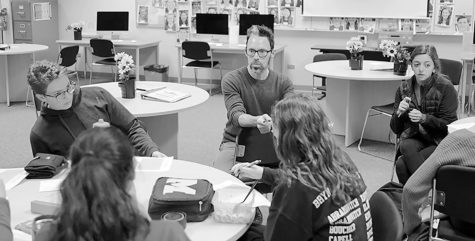English teachers alter junior research paper

Nearly all of her stress from the previous months of junior year melted away as she turned in one binder to her regular junior English teacher, senior Sophie Bilello recalls. Inside the well organized binder was her junior English research paper.
English teacher Christopher DeKuiper said the research paper has been changed this year for all regular and team junior English classes. Last year, DeKuiper and English teacher Emily Shamrock implemented the change in a pilot program for their regular level English classes.
According to DeKuiper, the research paper for the AP Language and Composition class will not be altered.
The biggest change from the old paper is the removal of the pro-con structure, according to DeKuiper. In the older version of the paper, students had to include a certain amount of paragraphs supporting and opposing the claim. Changing this structure allows students to think more strategically about their paper’s organization.
DeKuiper said the other changes give the project more meaning to the students, as well as more choices on how to complete the paper.
“The choices are … what novel to choose, what topics they think are important in the novel, why they think those topics are important, what might be their target audience for reading this novel … and what would be the target audience for the paper,” DeKuiper said.
According to English teacher Hannah Kang, who teaches junior team English classes, the old junior English research paper was based on addressing a contemporary issue, such as the topic of schools having a later start time.
DeKuiper said many of his incoming juniors already have the literary skills to write the old research paper, such as introducing and refuting counter arguments, composing signal phrases and using correct citations. Therefore, he believes they can handle writing the more independent research paper.
Bilello, who was in DeKuiper’s pilot program last year, said the skills she learned in her freshman, sophomore and junior year classes adequately equipped her to write the new research paper.
According to Bilello, after reading her novel, “The Perks of Being a Wallflower,” she researched topics presented in the book, such as mental health, and how they affect the characters in the novel and everyday life.
While writing the new paper last year was stressful, Bilello said she was more motivated to do so because of what she researched.
“Everyone [says the] junior research paper [is] really intense … but since I picked something that I knew meant a lot to me, I knew that it wouldn’t be as hard because I knew that I was interested in the topic,” Bilello said.
Kang said the change might add stress for the teachers because they may have more difficulty troubleshooting potential problems with the new project, but she believes the ARC will be able to help with any potential problems.
Junior Tommy Stocking, who is an ARC tutor, said he feels prepared to tutor kids on the new research paper.
“Just by understanding what this paper is about, we’ll be able to help the specific areas that need to be developed further in the structure [of the new paper] that is implemented,” Stocking said.
Bilello said the most effective way to write the new paper was to write about a topic that had value to her.
“I wanted it to mean something to someone, even if [DeKuiper] was the only one reading it,” Bilello said.

